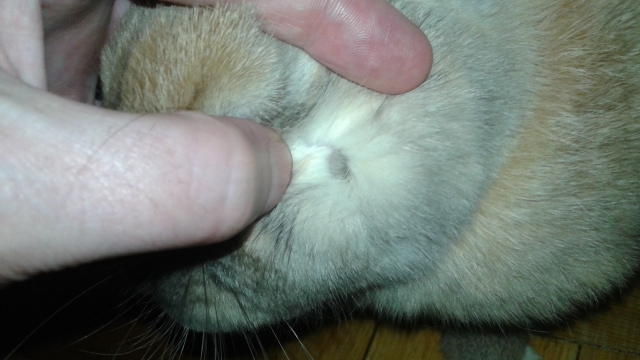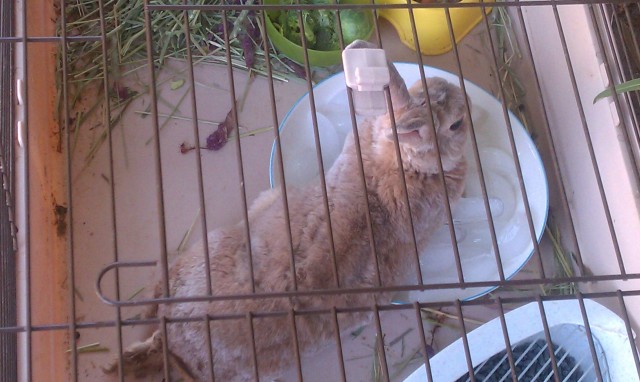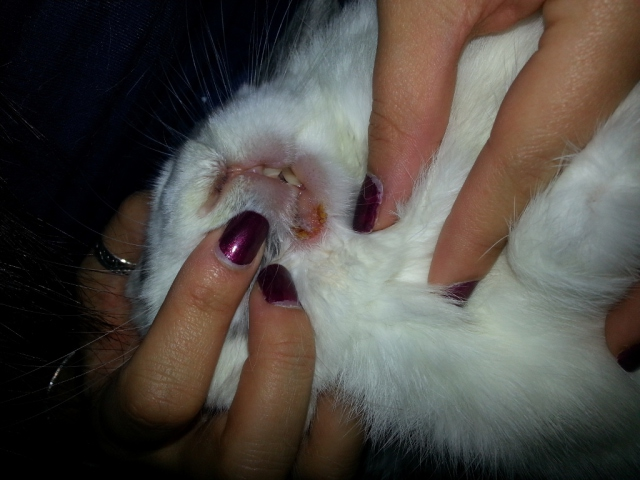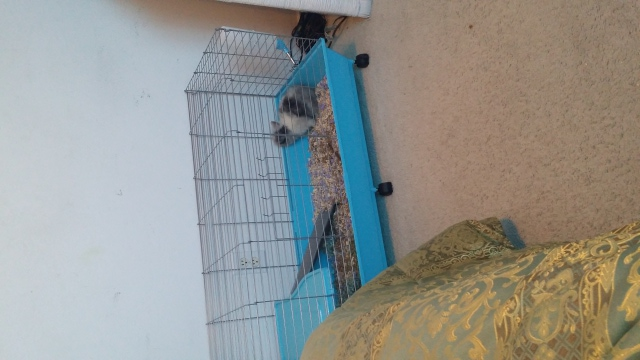Question have a tranlation:
I have 200 mother rabbits. The 60% of weaned babies, between 60 and 75 days old, die with diarrhea or swelled. I treated with some Coccidiostats, but unfortunately I have not had good medical results. In laboratory and medical tests the results are coccidia or mucoid enteropathy. I started with a new treatment, ponazuril, that I treated some rabbits. I am very worried because the situation is persistent. I will appreciate your help and recommendations. Best regards, Javier Pagan
AnswerHi Javier,
I remember this question from some time back. First, I am wondering how you came about using Ponazuril. There are very few vets that know about using that drug in rabbits. It is being tested to treat a serious protozoan infection known as E Cuniculi. It is a very expensive drug but has good potential.
If your rabbits are dying at 60-75 days old....the first thing I would look at would be diet. The mucoid enteropathy...soemthing we know as cecal dysbiosis....is caused by a bacterial imbalance in the GI tract. The most common pathogen identified is Clostridium. This bacteria is related to botulism and causes severe food poisoning in humans. It causes severe dehydration and usually death in rabbits. A secondary bacteria sometimes found is E Coli. I think your treatment should concentrate on why we have this imbalance and get that corrected. I suspect the coccidia is present due to a stressed immune system caused by the bacteria issue.
I do primarily wildlife and this is something we see often in eastern cottontails and marsh rabbits as the digestive systems of wild rabbits and domestic rabbits are identical. The only major difference is that wild rabbits fully wean much faster than domestics. In wild rabbits, it occurs about 21 days old. It is common to see diarrhea with a greenish colored mucous along with bloating. The green mucous (and sometimes you have to look closely) is a primary marker for an irritant in the intestinal tract...most often the bacteria I mentioned. The mucous is the body's attempt to protect itself. There is also usually a change in pH...to a more alkaline environment...and the beneficial bacteria can't handle that quick change...so the good stuff dies and the bad stuff grows. This condition many times lead to gastric ulcers which can easily perforate and that is fatal. The best treatment for this condition is prevention. Let's talk about what can cause these bacterial imbalances.
The most likely cause of this bacterial imbalance is diet...both what they are being fed and the quality. A rabbit's diet should be low protein/high fiber. In an adult rabbit, this means limited pellets and greens and unlimited grass hays. In rabbits the age you are mentioning should still be getting unlimited pellets and hay (even alfalfa) up until about 6 months old. The guts of rabbits can't handle large amounts of proteins or sugars. The easiest way to avoid excess proteins (which also stresses the kidneys) and sugars are to feed only pellets (high quality pellets...not the junk food with the litle colorful treats) If you are feeding them greens...I would remove them until you get a stable gut. And you will be surprised at where excess sugars can be found....carrots are loaded with sugar. I have also seen some of the vitamin supplements that are placed in the water cause digestive system problems. I do not add anything to water....jsut plain water.
Having said all of that...I think I would go after the bacteria instead of the coccidia. As I mentioned, the best treatment is prevention. But sometimes it still happens. I use a somewhat controversial treatment using an antibiotic known as Metronidazole (Flagyl). It is very effective against clostridium. The key is to catch it early as it does take some time for this antibiotic to start working. I use a probiotic....it has bacteria in it....to help stabilize the environment in the gut. It's not the correct type of naturally growimg bacteria...but it helps by changing and stabilizing the pH....a normal gut pH is 1-2. I use a product called Bene-Bac...there are similar products all over the world sold under various names. This product contains very helpful strains of L Casei and Enterococcus bacteria. Bloat can be helped by using Simethicone....it is for gas. I use human infant gas treatment commonly called Mylicon. The coccidia is difficult to treat. Most vets will use sulfa drugs...some of the more advanced doctors are using Ponazuril. Truth is....while these drugs help, the only thing that will stop coccidia is the rabbit's own immune system. Because os that, it is essential that you try to maintain as stress free of an environment as possible.
This is a lot of info. Read it over and get back to me. I am very interested in knowing exactly what you are feeding...everything you are feeding and in what amounts. I would also like to take a very close look at the labs and see what bacterial agents were found in the culture and what the pH of the gut was. I look forward to seeing this information. Maybe we can put together something to help you and your rabbits.

 black spots on Boos face
Question
boos face
I recently noticed some lumps
black spots on Boos face
Question
boos face
I recently noticed some lumps
 Heat and water
Question
frozen rabbit
I live in Arizona and recently a
Heat and water
Question
frozen rabbit
I live in Arizona and recently a
 Scabbing around mouth/possible mouth infection?
Question
bubbles mouth
Hello,
My bun Bubbles is
Scabbing around mouth/possible mouth infection?
Question
bubbles mouth
Hello,
My bun Bubbles is
 bunny growth
Question
At 5 weeks At 9 or 10 weeks
Hi. M
bunny growth
Question
At 5 weeks At 9 or 10 weeks
Hi. M
 I hit/spank my rabbit
QuestionQUESTION: Hey Dr. Krempels,
I have this habit o
I hit/spank my rabbit
QuestionQUESTION: Hey Dr. Krempels,
I have this habit o